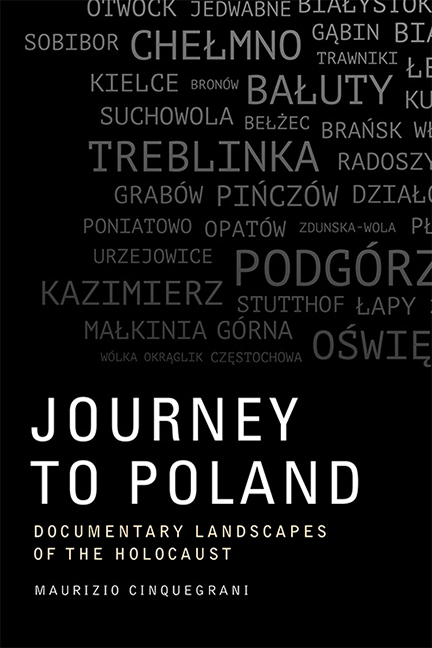Book contents
- Frontmatter
- Contents
- List of Figures
- Acknowledgements
- Dedication
- Prologue: Space, Time and the Holocaust
- 1 Countryside, Shtetl, City: The Murders of Mazovia, Jedwabne and Kielce
- 2 Conflicting Memories in the Shtetlekh Gąbin, Suchowola, Brańsk and Luboml
- 3 The Marketplaces of Postmemory in the Shtetlekh Eishyshok, Delatyn, Opatów, Zdunska Wola, Urzejowice and Pińczów
- 4 A Tale of Two Cities: Warsaw and Kraków
- 5 Another Tale of Two Cities: Lviv and Łódź
- 6 A Tale of Two Cities of Death: Treblinka and Oświęcim
- Epilogue: New Routes
- Bibliography
- Filmography
- Index
3 - The Marketplaces of Postmemory in the Shtetlekh Eishyshok, Delatyn, Opatów, Zdunska Wola, Urzejowice and Pińczów
Published online by Cambridge University Press: 10 November 2020
- Frontmatter
- Contents
- List of Figures
- Acknowledgements
- Dedication
- Prologue: Space, Time and the Holocaust
- 1 Countryside, Shtetl, City: The Murders of Mazovia, Jedwabne and Kielce
- 2 Conflicting Memories in the Shtetlekh Gąbin, Suchowola, Brańsk and Luboml
- 3 The Marketplaces of Postmemory in the Shtetlekh Eishyshok, Delatyn, Opatów, Zdunska Wola, Urzejowice and Pińczów
- 4 A Tale of Two Cities: Warsaw and Kraków
- 5 Another Tale of Two Cities: Lviv and Łódź
- 6 A Tale of Two Cities of Death: Treblinka and Oświęcim
- Epilogue: New Routes
- Bibliography
- Filmography
- Index
Summary
‘For as long as I can remember I have had nightmares and relived things that happened before I was born in a place I had never seen.’
— Debbie Goodstein, Voices from the AtticThe acquisition of knowledge and the exhumation of memories by means of site-specific explorations is central to the documentaries discussed in the previous chapters. In Packer's Back to Gombin, this transmission is articulated in terms of postmemory, with survivors and members of the postgeneration engaged in a visit to the ancestral shtetl aimed at unlocking painful memories of the Holocaust. In the present chapter, this process will be investigated in the context of a series of travel documentaries that use spaces such as market squares, cemeteries and synagogues in former shtetlekh as sites of postmemory. This chapter is divided into two parts, the first of which discusses There Once Was a Town (Jeffrey Bieber, 2000), Paint What You Remember (Slawomir Grünberg, 2009) and Return to My Shtetl Delatyn (Willy Lindwer, 1992) in relation to processes of postmemory; in particular, it addresses the historical importance of the marketplace as the place of the encounter between Poles and Jews and, in continuity with the argument introduced in the previous chapter, it focuses on the juxtaposition between archival images of the bustling marketplaces of the past and present-day footage of these locations.
The second half of the chapter is concerned with the intertwining of postmemory and individual and familial responses to the righteous actions of the Poles during the Holocaust. The memories of the pogroms in Jedwabne and Kielce, as well the persistence of anti-Semitism in postwar Poland, are a reminder of the active participation of Poles in the destruction of the Jews. As we already know, films such as Birthplace, Witnesses, The Legacy of Jedwabne and Shtetl have addressed such questions in connection with a series of site-specific events and their aftermath. Documentary cinema has also recorded return journeys to the shtetl where survivors and members of the postgenerations aim at expressing their gratitude to those Polish peasants who risked their own lives to save the Jews.
- Type
- Chapter
- Information
- Journey to PolandDocumentary Landscapes of the Holocaust, pp. 59 - 81Publisher: Edinburgh University PressPrint publication year: 2018



